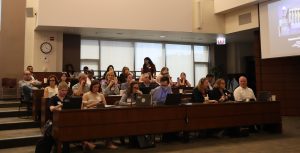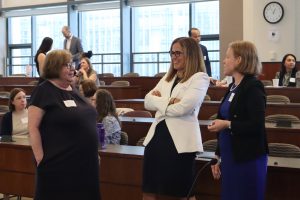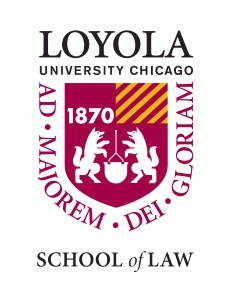By Jordan Hager & Brent Villasenor
Loyola University Chicago’s Education Law & Policy Institute hosted over 200 legal professionals, educators, and community members at the 11th Annual “Education Law: A Year In Review” seminar on June 12, 2024. Hosted by Professor Miranda Johnson, Clinical Professor of Law and Director of the Education Law & Policy Institute, the seminar explored changes in Illinois Education Law & Policy, recent updates to Title IX Federal Regulations, Special Education Hot Topics, recent Supreme Court cases impacting education, and an overview of the Department of Education’s Office of Civil Rights’ case processing and federal guidance on student-on-student harassment.
 Illinois Legislation & Policy Updates
Illinois Legislation & Policy Updates
Hector Rodriguez and Samantha White (Co-Directors of Government Relations) from the Illinois State Board of Education (ISBE) presented an overview of the Spring 2024 Illinois Legislative Session, which included the advancement of 47 bills, 9 new educational mandates, and 2 curricular mandates, as well as an update on mental and behavioral health screenings for students.
Notably, SB1 (enacted as PA 103-0594) which would create the Department of Early Childhood, passed both Houses on May 9, 2024, and was sent to the Governor on June 7, 2024. “The new department will be the lead State agency for administering and providing early childhood education and care programs and services to children and families […] historically managed by the State Board of Education, the Department of Human Services, and the department of Children and Family Services.”
Following the passage of PA 103-0837, every public high school will be required to provide instruction on climate change in alignment with State learning standards. Student’s ability to access “Accelerated Placement” in English language arts, mathematics, and science will be required in the 2027-28 school year.
Additionally, through PA 103-0771, Illinois will be the 5th State to require every voting school board member to be trained on improving student outcomes.
More updates on Teacher Vacancies (PA 103-0846), School Funding & Spending (PA 103-0644), School Discipline (PA 103-0896, PA 103-0806), Behavioral Health (PA 103-0885), and others can be found in ISBE’s presentation.
Finally, Julia Strehlow (Social Emotional Learning Lead) presented on lessons learned from a landscape scan conducted by the Children’s Behavioral Health Transformation Initiative. Based on the scan, 71% of school districts already have some form of mental health screening activities in place for students; 80% of school districts without screening activities reported a lack of qualified personnel as a barrier to universal screening. Recommendations following the study included Illinois taking a phased approach to universal mental health screening for all K-12 students enrolled in public schools, as well as supporting school districts with resources, guidance, and model policies to build effective systems of support for students’ mental health.
Title IX Updates
Attorneys Emily Tulloch, Kaitlin Atlas, and Amy Dickerson from Franczek P.C. presented on the updates to Title IX that went into effect on August 1, 2024. The updated regulations expanded the prohibition of discrimination to include sex stereotypes, pregnancy or related characteristics, and sexual orientation and gender identity. For example, the 2024 regulations require schools to provide reasonable accommodations for individuals who fit these characteristics. While the characteristics of who this applies to is more comprehensive, the new regulations allow schools greater flexibility in handling grievances in compliance with the law.
Under the 2024 regulations, a school must respond promptly and effectively when it has knowledge of conduct that reasonably may constitute sex discrimination. These reporting requirements apply to all employees whether in the K-12 or Higher Education Context.
As with the 2020 regulations, what constitutes sex-based harassment has remained the same: hostile work environment, quid pro quo and sexual violence. However, the definition of each category changed. Most notably, the new regulations consider a hostile environment any unwelcome sex-based conduct, that based on the totality of the circumstances is subjectively and objectively offensive and is so severe or pervasive that it limits or denies a person’s ability to participate or benefit from the education program or activity. In addition, hostile environment is now a fact-based inquiry that includes factors such as context, type, duration, identity, location, number, age, and relationships of the persons involved. Furthermore, sex-based harassment could now be just one isolated comment if it meets all the elements. The definition of quid pro quo changed to include any agent or person authorized by the school who engages in such conduct. Title IX now incorporates the Clery Act definitions of sexual assault, domestic violence, dating violence, and stalking.
Furthermore, the definition of a “program or activity” was limited to any building owned or controlled by a student organization that is officially recognized by a postsecondary institution and subject to the recipient’s disciplinary authority. This includes online behavior and conduct that occurs outside of the United States in a program or activity (ex. During a study abroad program).
Finally, as part of the 2024 regulations, there are no mandatory bases for dismissal, only permissive. A school may dismiss a complaint if 1) the respondent is unable to be identified, 2) respondent is not participating or employed in the education program or activity, 3) the complaint is withdrawn, 4) the complaint is withdrawn and without the withdrawn allegations, the remaining conduct would not constitute a Title IX violation, and 5) even if true, the conduct would not constitute sex discrimination under Title IX.[1]
Hot Topics in Special Education Law
Caroline Roselli (Partner at Robbins Schwartz) and Micki Moran (Partner at Grund and Leavitt) presented on pressing topics in special education law.

The first key issue was on student attendance and school refusal. Since the pandemic, chronic absenteeism rose from 15% in 2019 to 29.7% in 2023. While this number fell from the previous year, this is 75% higher than the pre-pandemic baseline. Notably, absenteeism rates were highest in low-income districts with low student achievement. The presentation then went through the triggers of a Child Find, which requires schools in Illinois to seek out and identify all children with disabilities from birth through age 21 within the district. Some recommendations for a district’s Child Find were to develop a system for tracking attendance between schools, teachers, and classes, and create a MTSS screener to determine the function of absences. For example, a school can create a protocol to determine when students will be referred to be screened. In effort to combat the issue of absenteeism and complying with Child Find triggers, districts must be creative in meeting those obligations.
The presenters then discussed a few key cases regarding student attendance. In J.H. v. Seattle Public Schools, parents of a student with special needs provided the school district with a unilateral notice of residential placement, which the district denied. The school provided behavioral support that yielded incremental results, but not to the degree to which the parents were satisfied. The Court held the residential placement was not required to receive a FAPE because the behavioral issues could be remedied inside the public-school setting. The court noted that while parents may want immediate results, school districts may take a reasonable amount of time to determine whether interventions are successfully and when to implement new plans.
Next, in Independent School Dist. No. 282 v. E.D.M.H., the 8th Circuit ruled that a student’s anxiety and depression are not barriers to deny special education access. Rather, a student’s academic performance is all but one factor in determining a student’s need for specialized instruction. Other factors a team may rely on is absences and credits earned toward graduation.
These two cases speak to the district’s responsibility to frequently assess and intervene with school-based supports prior to utilizing outside programs. Furthermore, courts recognize that such interventions take time to create results, and schools should be afforded reasonable opportunity for the effects to take place. Finally, schools must look at the totality of the circumstances when determining whether a student may receive specialized instruction beyond their academic achievement.
Lastly, the presenters discussed updates in bullying and school discipline. As required by PA 99-0456 (commonly referred to as “SB 100”), which was enacted in 2015, Illinois limited the use of exclusionary discipline in its schools. In John Zimny v. Geneva Community School District, a student with a motor disability experience harassment and bullying from peers. Every time the student complained, the student was disciplined. The school would either not discipline the other students or would give them less severe consequences. The court held that the district discriminated against the student by refusing to address his complaints and even punishing him for it. This case stands for the necessity for districts to always go through the formal investigation process when a complaint of bullying and harassment is made.
Supreme Court Updates
Mark Walsh, Contributing Editor at Education Week, opened his presentation on Supreme Court updates which may impact Education Law by commemorating the 70th Anniversary of the Brown v. Board of Education decision by sharing Oyez’s “Brown Revisited” project, which, through artificial intelligence, has “recreated” Chief Justice Marshal’s oration of the landmark decision. This was Mark’s third year giving his entertaining, and informative updates.
To wrap up the 2023 Supreme Court session, decisions from Students for Fair Admissions, Inc. v. Harvard & UNC and 303 Creative LLC v. Elenis were shared. While the tie to education law in the Harvard & UNC case is center stage, the 303 Creative LLC decision’s impact is more elusive. The majority opinion, by Justice Gorsuch, cited West Virginia Bd. Of Ed. v. Barnette (holding students cannot be compelled to recite the Pledge of Allegiance) to support the holding, while Justice Sotomayor defended the dissent through Runyon v. McCrary (holding secular private schools may not exclude students based upon their race).
To begin the review of the 2024 session, the consistency in the Court’s denial of certiorari in cases presenting transgender issues was highlighted (A.C. v. Metro. Sch. Dist. Of Martinsville, Parents v. Montgomery Cnty. Bd. Of Educ.).
In O’Connor-Ratcliff v. Garnier, the Supreme Court issued a per curiam opinion referencing their same-day ruling in Lindke v. Freed which held that a public official can be held liable for blocking constituents on social media. Title VII challenges were addressed in Muldrow v. City of St. Louis. The long-held Chevron-doctrine, which requires courts to defer to administrative agency’s interpretation of statutes which may be silent or ambiguous on specific issues, was being considered in Loper Bright Enters. v. Raimondo[2]. Lastly, Mr. Walsh explained that the newly-published Title IX regulations are being challenged by several states.[3]
Office for Civil Rights: Case Processing and Federal Guidance on Student-on-Student Harassment
Adelle Rapport, Senior Legal Advisor to the Assistant Secretary and Deputy Assistant Secretary for Enforcement at the United States Department of Education’s Office of Civil Rights, provided guidance on the OCR complaint process, as well as addressed common definitions for discriminatory harassment. The Office of Civil Rights received 19,223 complaints nationally in 2023, and of these, 1,281 originated in Chicago. As of May 31, 2024, OCR has received more than 10,000 complaints. The OCR Case Processing Manual offers a thorough description of the steps taken in response to a complaint, including Dismissal (§ 110), Mediation (§ 201), Voluntary Resolution Agreements (§ 301), Resolution Agreement (§ 303), and Enforcement Action (Article VI). Practitioners are encouraged to complete “prompt…thorough…impartial” investigations into allegations to ensure harm reduction.
Reception
Following the presentations, a networking reception provided guests the opportunity to connect and celebrate accomplishments over the past year.

________________________________________________________
[1] By September 2024, the newly promulgated Title IX rules were enjoined from being enforced in 26 States (Alabama, Alaska, Arkansas, Florida, Georgia, Idaho, Indiana, Iowa, Kansas, Kentucky, Louisiana, Mississippi, Missouri, Montana, Nebraska, North Dakota, Ohio, Oklahoma, South Carolina, South Dakota, Tennessee, Texas, Utah, Virginia, West Virginia, and Wyoming). The 2020 Title IX Final Rule is in effect in these states. Illinois is among the states where the 2024 Rule is enforceable.
[2] Since this presentation was given, the Loper Bright Enterprises decision overturned the long-held Chevron-doctrine, which will allow for courts to interpret ambiguities in statutory language.
[3] As of September 2024, the 2024 Title IX regulations have been enjoined from being enforced in 26 States.

